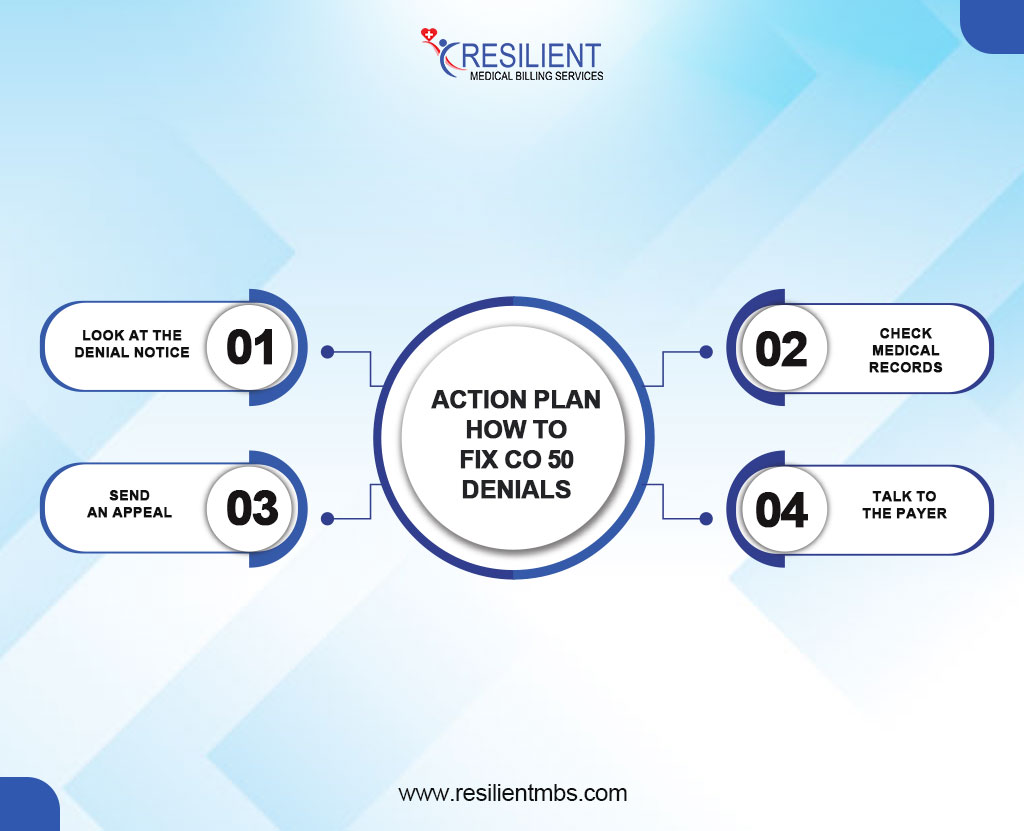Claim denials are a common challenge in medical billing, often causing payment delays and extra work for providers. Studies show that 15–20% of medical claims are denied at first, and about 5–7% of these denials happen because services are labeled “not medically necessary.”
This is where the CO 50 denial code comes in; it means the insurance company decided the service wasn’t needed under their rules.
These denials not only slow down payments but also force providers to spend more time fixing and resubmitting claims. By understanding what the CO 50 denial means and how to prevent it, healthcare providers can reduce billing problems and keep their track payments.
What is Denial Code CO 50?
CO-50 Denial Code Description
The CO 50 denial code means the insurance company does not think the service was medically necessary for the patient’s condition. In other words, they believe the treatment or procedure was not needed.
This is different from other denial codes like:
CO 97 – when a service is already included in another payment.
CO 16 – when the claim has missing or incorrect information.
CO 50 is not about billing mistakes. It’s directly about medical necessity. Knowing this helps providers focus on the right solution, such as improving documentation, checking payer rules in advance, or appealing with strong medical evidence.
Common Reasons for CO 50 Denials – CO 50 Denial Code Reason
Insurance companies may issue a CO 50 denial when the service does not match their rules for medical necessity. This can happen when:
- A test is ordered without enough clinical justification.
- Services are provided more often than the payer allows.
- A procedure is considered elective or cosmetic.
- Sometimes, denials are also caused by errors in documentation or coding, such as:
- Missing or incomplete medical records.
- Lack of detailed clinical notes.
- Using the wrong CPT or ICD-10 codes
Action Plan – How to Fix CO 50 Denials
If your claim is denied with a CO 50 code, here’s what to do:

- Look at the denial notice: Check the Explanation of Benefits (EOB) to see why the insurance company said the service wasn’t medically necessary.
- Check medical records: Make sure the patient’s chart clearly explains why the treatment was needed and that it follows the payer’s rules.
- Send an appeal: If the service was necessary, submit an appeal with complete notes, test results, and any guidelines that support your case.
- Talk to the payer: If something isn’t clear, call the insurance company. Direct communication can clear up issues and prevent future denials.
How to Prevent CO 50 Denials
To avoid these denials in the first place, try these steps:
Keep documentation strong: Make sure clinical notes explain why the service was needed, and use correct codes.
Get prior approvals: For services that require it, get authorization from the insurance company first.
Train your team: Teach staff and providers about documentation, coding, and payer rules.
Use tools and audits: Billing software and regular audits can help spot problems early and reduce repeated denials.
Final Words
The CO 50 denial code is a reminder of how important it is to show medical necessity in every claim. When insurance companies deny a claim with this code, it usually means the service wasn’t proven to be necessary based on their guidelines. Common causes include missing documentation, coding errors, or not meeting payer requirements. These issues can slow down payments and create extra work for healthcare providers.
The good news is that CO 50 denials can often be prevented. Clear and detailed patient records, accurate coding, and regular staff training make a big difference.
Using advanced billing tools can also help providers catch potential problems before claims are submitted. Taking these proactive steps not only helps recover denied claims but also reduces the risk of future denials, leading to faster payments and more financial stability.
If your practice is struggling with CO 50 or other billing challenges, expert support can save time and reduce stress.
Contact Resilient MBS today to get the proper guidance and solutions for managing denials and improving claim success.
FAQs
What does the CO 50 denial code mean?
CO 50 denial means the insurance company decided that the service you billed for was not medically necessary. In other words, they believe the treatment wasn’t needed based on their rules or the information provided.
How can I avoid a CO-50 denial?
You can lower the chances of this denial by:
- Making sure medical records clearly explain why the service was needed.
- Checking the insurance policy to confirm coverage before treatment.
- Using the correct diagnosis and procedure codes.
- Training staff to spot possible issues before claims are sent.
Is denial code 50 always related to medical necessity?
Yes. CO 50 is always about whether the insurance company thinks the care was medically necessary. Other denial codes deal with different problems, like eligibility or billing mistakes.
What documents should I include when appealing a CO 50 denial code?
If you appeal, include:
- Detailed patient notes from the provider.
- Test results or reports that support the treatment.
- Guidelines or references that show the service is standard care.
- A short letter explaining why the treatment was necessary.
Can billing software help prevent CO-50 denials?
Yes. Good billing software can:
- Catch missing or incomplete documentation.
- Match codes correctly with payer rules.
- Check eligibility and authorizations automatically.
- Show patterns in denials so you can fix problems early.










